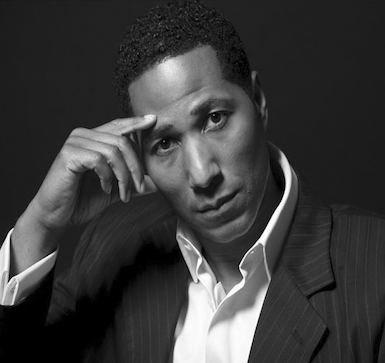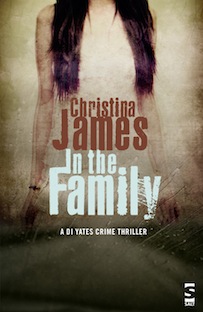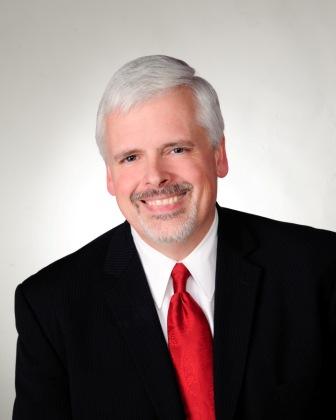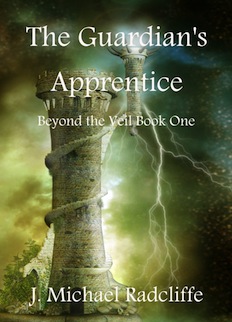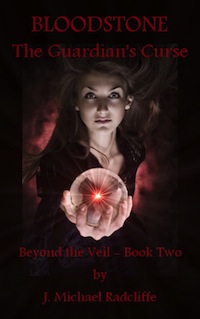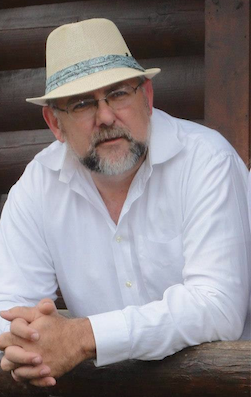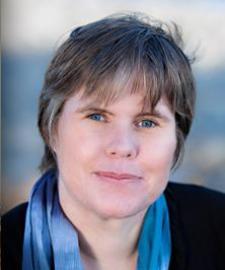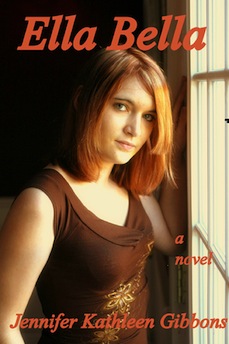Michael Jecks is the author of the best-selling Templar Series, as well as other titles. As well as writing thirty four novels, he has been chairman of the Crime Writers’ Association, the founder of Medieval Murderers, helped set up the Historical Writers’ Association, and is a keen supporter of new writers and writing. He is a regular speaker and panelist at festivals and other events worldwide.
What is your latest book?
My most recent book is also the first.
I’ve been writing my Templar Series for the last twenty years, and there are over thirty titles in the series. But this latest book is a prequel, because I wanted to show how my leading character came to be the man he grew into. So I wrote Templar’s Acre, which is a book about a boy growing into a man in medieval times – it’s a story of love and loss, battle and defeat, and shows how a siege and the catastrophe of war affects the people of a major town.
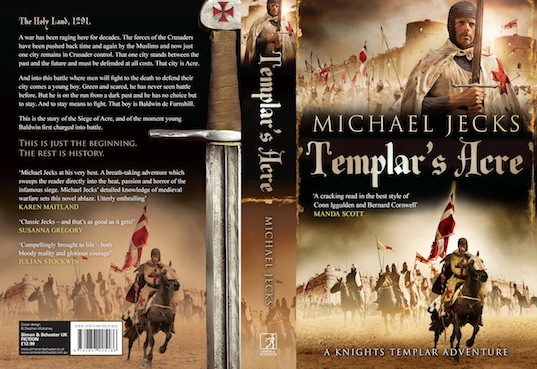
What are the special challenges in writing a series?
Some time ago I formed the performance group Medieval Murderers. The great thing is, we are five professional writers who love history, but who conduct our research, our writing and every other aspect of our work in very different ways. I love having a series because it takes away reinvention, while friends like Karen Maitland detest the very idea. The thought of being tied to the same characters for a series drives her to distraction. Personally, I love the fact that I can start a book already knowing my characters and their families. I can get straight into the plot.
In the last year I’ve written two books out of series – Fields of Glory, out in 2014 about the Hundred Years War, and Act of Vengeance, a modern day spy thriller, so both books that are out of series, and I found them enormously challenging. The task of finding new people is not so easy, I find. It’s rather like trying to find new friends. So I reckon I will stick to writing series novels. It’s easier.
What part of writing a novel you enjoy the most?
The real pleasure for me is when I’m well into the book. I love the process of sitting back and imagining other people, other times, other lives. For me, it’s as good as a holiday. I am getting into the mindsets of people I could never usually meet, and learning how they behave and react. It’s the most wonderful feeling to live three or four different lives in a week.
Please, tell us about your experiences with social media. What are your favorite and least-favorite parts of it?
I am no youngster, but I am lucky to have been involved with computers really since before the appearance of PCs. I was a computer salesman for thirteen years before starting to write. But social media is, I think, frankly terrifying.
People are getting more and more used to communicating purely in short bursts, either in texts or Twitter messages. That’s fine, but it is decreasing the attention span of some people. There has been research that shows people are less able to cope with holding concepts and thoughts over a longer period, which is due to receiving brief articles and shorter lumps of information.
Personally I see all social media as simple marketing tools. I do not contact friends and family on them, because I prefer to phone them! I like hearing someone’s voice. However, social media have given me a great way of communicating with my readers, with booksellers, and with other people who may not otherwise have bothered to read my books.
My biggest problem with it is, that it takes up so much time. In the past I could write a book for hours a day, and be totally immersed in my story. I’m getting there again, but only because I work very hard to be focused.
Do you allow others to read your work in progress, or do you keep it a secret until you’ve finished your first draft? Can you elaborate?
Never! Never! My book is my book. To my mind, the only people who should see my work before it’s finished and ready to print are my editor and my agent: no one else at all. Putting a book out for comments before that, to me, is an abrogation of the author’s responsibility to tell the story the best he or she can. It’s not collaborative, with a committee deciding how my characters should behave or speak. That’s my job, and mine alone. No, I would never let someone see rough drafts or work in progress. The thought fills me with horror.
We all know the old saying; you can’t judge a book by its cover. This is true. However, how much importance do you place on your book cover design?
This is true – but now, in the world of ebooks, you can’t judge a book without a cover, I think. I’ve recently tested the water with ebooks. I’ve had collections of short stories put out by me, with a cover I designed, and one designed by a professional. I’ve also written my own modern spy story, Act of Vengeance, which I put out through a publisher to make sure it was edited. The books have done really well, but I’m sure that the professional covers make a vast difference, especially for people looking at thumbnails on Amazon. You need something striking, simple, intriguing and attractive. With so many hundreds of thousands of self-published books on sale now, you have to make your own stand out as being professional in appearance. Otherwise people won’t look inside the cover.
How would you define your style of writing?
I’d say my writing is fluid. It’s not ‘literary” because I think of literary writers as pretentious. Real literary quality is not defined by an author, but by those who read it. Dickens was a hack journalist, and looked down on at first (I’ll bet many authors who saw his success remained sniffy about his writing). I write modern thrillers, effectively, which happen to be based in the past. But I very deliberately do not make the books hard going. I am thrilled and delighted by history, and most of my readers grow to be after reading my works, but a lot come to me without any interest in Medieval English history at first. That, to me, is proof of the merit of my work. If I can entertain and provide a feel for how things were, that’s good enough for me.
A lot of authors are frustrated by readers who don’t understand how important reviews are? What would you say to a reader who doesn’t think his or her review matters?
People who read books and put reviews up have a HUGE responsibility. Let me explain. When my first book came out, the first fan letter opened by my editor listed 21 factual inaccuracies in the novel. She, having commissioned me for three books, was not surprisingly very upset to think that I could wreck her career.
When I saw the inaccuracies listed, they ranged from details – how far could a horse ride in a set period – to aspects of history – the siege of Acre wasn’t 1291 but 1191, with Saracens besieged by Christians, rather than the other way around. Well, the writer was correct about 1191 – but 100 years later, the roles were reversed. The great siege of Acre is accepted generally as being 1291 when a small body of Christians were wiped out by a massive army of Mameluks.
Now that person could easily have destroyed my career, and possibly damaged my editor’s, by his thoughtless comments. Or were they thoughtless? Now we are used to the problem of trolls on the Internet. Some people write disparagingly about novels partly, it seems, because they are frustrated writers themselves. It is more jealousy than valid commentary.
Be that as it may, when people write reviews, they are potentially harming another human’s future. Some may give up writing completely as a result of a poor review.
That case was a salutary lesson for me. On Amazon and other sites you will often see dreadful comments about other people’s work. I don’t think they are ever justified. A bad book in one person’s eyes could well be thought brilliant by someone else. I distinctly recall published authors being sniffy about, in succession, Harry Potter, Da Vinci Code and Shades of Grey. Just because it’s not your cup of tea, there is no need to go and destroy someone else’s career. So, if in doubt, if you really dislike a work, don’t give it a miserable score – just don’t review it.
Do you ever suffer from writer’s block? If so, how do you get around it?
I do not suffer from it. There is a theory that writer’s block is the inevitable consequence of thinking up new plots, characters and stories, and if the ‘muse’ departs on holiday, the author’s left bereft.
Twaddle.
I was for a while the Chairman of the Crime Writer’s Association. I know all the really good writers from that organisation – and I do not know a single one who has suffered from the block. All of us, if we’re professional writers, just sit down and get on with it. We have to. If you don’t write, you don’t deserve to call yourself a writer.
However, I do believe that two things are crucial. First, if you are financially solvent, writer’s block is easier to accommodate. It’s noticeable that those who complain of it are usually amongst the wealthier people. The second is, if you work to a routine, the block is far less likely.
I tend to write in one-hour segments. The first forty-five to fifty is actual writing, the rest is off getting coffee, tea, or disposing of the last drink, while thinking through the next scene I have to write. That way, I can put down 1,000 words per hour. After the first work, which is editing the previous day’s work, I can count on 5,000 words a day. There isn’t time for writer’s block with a schedule like that!
Where do you live now? If you had to move to another city/state/country, where might that be?
I was born and raised in Surrey here in England, but from before I was born, every Easter my family would bring me to Devon and I’ve had a feeling of huge affinity for the county all my life. When I was selling computers in the 80s, it was impossible to move to the south-west, but as soon as my sixth book was published, I could move, and my wife and I bought a small house in the north of Dartmoor, where the Hound of the Baskervilles was set. It is extraordinarily atmospheric, with a character all of its own, and I adore it. I don’t think I’d ever be able to move away (unless I was told there was a house for me in the Rockies or in Alaska).
Have you ever played a practical joke on a friend? Ever had one played on you?
Many times. I tend to be a rather amiable buffoon, and it’s easy to make me look a complete twerp. When I was very young, in my last year at school, I used to have a Mini. They were great little cars, but they were designed for simplicity, so, if you needed to pop the bonnet (the hood to Americans), there was a release catch outside the car. Not a release inside. That meant anyone could break into the engine compartment.
Well, I have a great friend, now a very wealthy businessman, who always had an eye for a joke. He used to pop the bonnet every so often, and take off the spark plug caps. I would hop inside, turn the key, and hear the engine whizz round, but not start. After this happened a few times, I got a little irritable. I think it’s because one day it was raining, and I had to get my hands mucky trying to get the plug caps back on while getting soaked. So that weekend, I cut a little tube of plastic, put a cork in one end with two pins sticking into the tube itself, and put in a bubble of mercury from a broken thermometer. I covered the other end and wired this to the airhorns. Next time Nick opened the bonnet, the switch fixed to the bonnet itself tipped the mercury to the two connectors, and the horns blared very loudly in his ears.
He never tried that trick again!
What was your favourite year at school?
It was my last before the O-levels. These were the exams taken by sixteen year olds, and I remember that as a time of real peace. We were left for the first time to study pretty much on our own, revising our work. For once that summer was glorious, and I have memories of sitting out in the garden, with a lovely view across a valley, at the hillside opposite. In those days we had a Bernese Mountain Dog and a Rhodesian Ridgeback, and the two used to sit beside me as I worked. I remember reading Albert Camus’ book The Plague, and discovering Light Cavalry Action by John Harris, still one of my favourite books of all time. So for me that year was one of academic achievement (I did well in the exams), but also one of peace. Life is easy when you don’t have to earn a living.
What makes you angry?
Injustice. I despise Tony Blair for his deplorable behaviour towards any section unable to defend themselves, for example. He removed the House of Lords as an independent system by accusing them of blocking his laws in parliament (they didn’t). He blamed pistol shooters because of police failings which led to a man illegally being granted a pistol licence at Dunblane, and blamed the shooting community, depriving a hundred thousand people of their property and sports. And worst of all, he took the case of a terrorist attack in a foreign country to implement the most draconian laws imposed on the English since the Norman invasion. Like the Templars, arrested without explanation, people were arrested and held in prison without the right to a fair trial in which they could be told why they were arrested, what they were supposed to have done or who had accused them.
He reversed centuries of justice because of what happened in New York in 9/11, when for the previous twenty or thirty years, Irish terrorism causing billions of pounds of damage and killing hundreds, had not justified such extreme measures.
I detest injustice. I don’t care whether it is the injustice of a dog being put down because someone felt threatened by it, or the injustice of Police officers shooting an unarmed man and getting away with it.
I am now kicking away that soapbox …
What music soothes your soul?
All music appeals to me. For different moods, different music works better.
From my youth, Pink Floyd and Neil Young still exert a strong pull. I can be put in mind of Lord of the Rings or Elliot O’Donnell’s Casebook of Ghosts by ‘After the Goldrush’, for example. But although I love rock and (some) pop, I am really a classical music lover, I think, first and foremost. I adore the Russian composers, particularly Shostakovich and Prokofiev, and French such as Ravel and Debussy. Then again, I am very keen on English composers: Walton, Delius, Elgar – and Americans like Barber. Basically, I find all music has something of value.
Except Rap. Sorry, I don’t like the violence and crudeness inherent in the music and the culture.
What simple pleasures make you smile?
Walking my dogs over the moors in bright sunshine, or in the cool, or in the snow. Just walking, really.
Sitting outside a pub on a warm summer’s afternoon with a pint of good ale.
A roast meal with my family and a good bottle of wine.
Reading a book or to sit and paint a view.
CONNECT WITH MICHAEL
Website
Blog
aboutme
Twitter
Facebook Author Page
Goodreads



